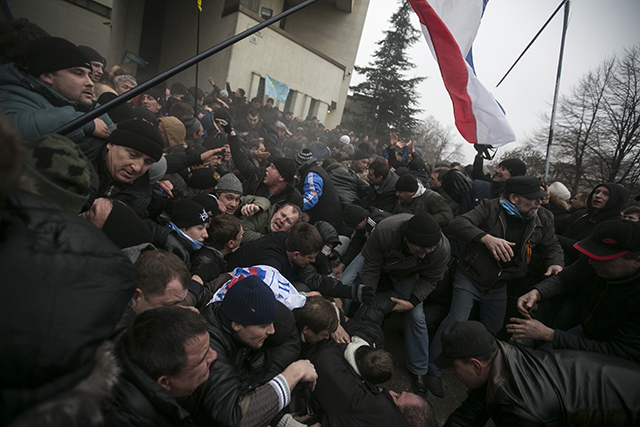Why the Russian Occupation of Crimea Could Lead to a New Islamist Terror Hotspot
Ariel Cohen /
As Putin is tightening his grip on the Crimean Peninsula, the Crimean Tatars are becoming increasingly worried about their future.
By annexing the Crimea to Russia, Moscow will most likely radicalize an otherwise peaceful indigenous Tatar community. One of Tatars’ political leaders, a member of Ukrainian Parliament, Mustafa Jemilev, has warned that Tatars are already forming self-defense units to get ready for a struggle against the Russians. Jemilev is not an Islamist himself. He is a historian who was among the ones cleansed by Stalin in 1944.
As conflict between Russia and the Crimean Tatars escalates, there is a danger that it might bring international extremist organizations like al-Qaeda into the region, as happened in Chechnya during Russia’s military campaigns there in the late 1990s and early 2000s. Some Tatar extremists, who are Sunni Muslim, have already fought in Syria against the pro-Iranian Alawite regime of Bashar El-Assad and have links to the Islamic militants.
If Islamization and radicalization of the Crimean Tatars takes place, Moscow will have no one to blame but itself. However, security repercussions of such a development would echo beyond the Crimea, which is strategically located in the Black Sea and is part of Europe. Moreover, a jihad (Islamic “holy war”) in the Crimea would open another Islamist front against Russia, which has been fighting a long war in North Caucasus – since the second half of the eighteenth century – against local Moslem ethnic groups there, including the Chechens, the Ingush, and many others.
The Tatar concerns have deep historic roots and are based on facts, not fears. This year marks seventieth anniversary of deportation of the entire population of Crimean Tatars by Joseph Stalin to North Kazakhstan and Central Asia in 1944. Up to 25 percent of the Crimean Tatars died in these deportations. Tatars were allowed to return to their homeland after 1989. Now, they are worried that if Russia annexes Crimea, they could face another forcible deportation.
On Sunday, March 16, Crimea will hold an illegal referendum on whether it should become a part of Russia. The Tatars, who compose over 12 percent of the Crimean population and have been largely supportive of the Ukrainian governments in Kyiv, are planning to boycott the referendum.
Most Islamic organizations in the Crimea are allied in the Spiritual Directorate of Muslims of Crimea and have close connections to Turkey, which also hosts a large diaspora of Crimean Tatars. Turkey has a particular interest in the region across the Black Sea, as the Crimea was a vassal of the Ottoman Empire until Catherine the Great brought it under Russian control in 1771-1783.
Moscow’s support of the Assad regime has already strained its relationship with Ankara, and that relationship is poised to worsen even more if Russia begins a crackdown on the Tatars.
Today, the pro-Russian Crimean “government” tried to reassure the Crimean Tatars’ leadership of their good intentions by offering them several positions, including those of “Deputy Prime Minister, two ministerial seats and top offices in the rest of departments,” according to The Voice of Russia. In addition, the Financial Times reports they were offered “financial help for returning Tatars and even committed to reinstating the original Tatar names of some towns and villages.” However, the Tatars remain suspicious of the deal and are unwilling to sign it, fearing that the Crimean government and the Russians cannot be trusted.
It will be a tragedy if Russia’s heavy-handed moves in the Crimea ignite the fire of the religious war. If this happens, Russian policy makers will have only themselves to blame.

